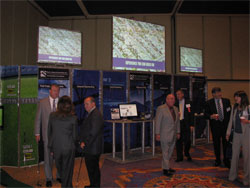Handling Construction Defect Claims – New Edition Released
February 11, 2013 —
CDJ STAFFA lot has changed in the twenty-seven years since the Miller Law firm first released Handling Construction Defect Claims: Western States, and those changes are reflected in the recent publication of the fourth edition. Frank H. Wu, the Chancellor and Dean of UC Hastings College of Law describes the work as “more than a scholar’s treatise, it is the first resource for construction defect plaintiff and defense attorneys; as well as mediators, arbitrators and judges — or ought to be!” In the time since the first edition, the number of homeowner associations has grown nearly ten-fold. Further, as Rachel M. Miller, a Senior Partner at the firm and one of the authors, notes, “thousands of construction defect claims are filed every year, and in most cases, the developers insurance pick up these claims.”
The book is available at Amazon at a price of $299.
Read the court decisionRead the full story...Reprinted courtesy of
The Privilege Is All Mine: California Appellate Court Finds Law Firm Holds Attorney Work Product Privilege Applicable to Documents Created by Formerly Employed Attorney
June 29, 2017 —
David W. Evans & Stephen J. Squillario – Haight Brown & Bonesteel LLPIn Tucker Ellis LLP v. Superior Court (A148956 – Filed 6/21/2017), the First Appellate District held that (1) the holder of the attorney work product privilege is the employer law firm rather than the former employee attorney who created the privileged documents while a firm employee, and (2) as a result, the firm did not owe a duty to obtain the former attorney’s permission before disclosing the subject documents to third parties.
In Tucker Ellis LLP, the attorney, while still employed by Tucker Ellis, exchanged a series of e-mails with a consultant retained by the firm to assist in asbestos litigation for a client. The firm also entered into an agreement with the consultant to summarize scientific studies on the causes of mesothelioma in a published review article. After the attorney departed the firm, Tucker Ellis was served with a subpoena in connection with a matter pending in Kentucky for the production of communications with the consultant regarding the article. In response, Tucker Ellis, in relevant part, produced the work product e-mails authored by the former attorney. The e-mails eventually ended up on the Internet and reached over 50 asbestos plaintiffs’ attorneys, resulting in the attorney’s termination from his new firm. After Tucker Ellis ignored the attorney’s “claw-back” letter, he filed suit against the firm for negligence, among other causes of action. The trial court granted the former attorney’s motion for summary adjudication on the issue of duty, reasoning that the firm owed the attorney a legal duty to prevent the disclosure of the work product. Tucker Ellis filed a petition for a writ of mandate with the Court of Appeal challenging the trial court’s decision on the duty issue.
Reprinted courtesy of
David W. Evans, Haight Brown & Bonesteel LLP and
Stephen J. Squillario, Haight Brown & Bonesteel LLP
Mr. Evans may be contacted at devans@hbblaw.com
Mr. Squillario may be contacted at ssquillario@hbblaw.com
Read the court decisionRead the full story...Reprinted courtesy of
New York Court Finds No Coverage Owed for Asbestos Losses Because Insured Failed to Prove Material Terms
February 15, 2021 —
Gregory S. Capps & Marianne E. Bradley - White and Williams LLPIn the long-tail insurance context, it is not unusual to have issues arise addressing “lost” or “missing” policies. In an opinion issued on January 22, 2021, a New York court ruled that an insurer did not owe coverage to its insured for underlying asbestos claims because the insured had failed to establish the material terms of a “lost” policy under which it sought coverage for the underlying claims. The lawsuit, Cosmopolitan Shipping Company, Inc. v. Continental Insurance Company,[1] arose out of a coverage dispute between Plaintiff Cosmopolitan Shipping Co., Inc. (Cosmopolitan) and its insurance carrier, Continental Insurance Company (CIC), in connection with bodily injury claims arising out of asbestos exposure. The case provides a good analysis of what an insured must do to establish coverage under a “lost” or “missing” policy.
During and after World War II, Cosmopolitan chartered and operated a number of shipping vessels on behalf of United Nations Relief and Rehabilitation Administration (UNRRA). In the 1980s, seamen who had worked on board Cosmopolitan’s vessels between 1946 and 1948 filed lawsuits against Cosmopolitan seeking damages for injuries arising out of alleged exposure to asbestos on Cosmopolitan’s vessels. Cosmopolitan sought coverage from CIC for the claims, alleging that CIC had insured Cosmopolitan’s vessels during the relevant time period under a protection and indemnity policy issued to the UNRAA (the P&I Policy).
Reprinted courtesy of
Gregory S. Capps, White and Williams LLP and
Marianne E. Bradley, White and Williams LLP
Mr. Capps may be contacted at cappsg@whiteandwilliams.com
Ms. Bradley may be contacted at bradleym@whiteandwilliams.com
Read the court decisionRead the full story...Reprinted courtesy of
The Metaphysics of When an Accident is an “Accident” (or Not) Under Your Insurance Policy
August 02, 2017 —
Garret Murai - California Construction Law BlogAs an undergrad, I remember taking an introductory philosophy class. When we came to the chapter on metaphysics our professor asked what makes an apple an apple? “We have a specific name for it, presumably, to distinguish it from other things,” she said. “But what makes an apple an apple?”
From there we went into a rabbit hole. With some students describing an apple by its colors, shape, size, smell and that it grows on trees and others trying to distinguish an apple from other things, which in turn led to further discussions such as why we believe apples come in red, green and yellow, whether an apple is still an apple if a person was colorblind, etc. In the end, we were questioning whether we were even in existence and sitting in a university classroom.
Insurance can be a bit like that sometimes. When is an accident an accident? If you engage in an intentional act that results in an unintended consequence, is it an accident? In Navigators Specialty Insurance Company v. Moorefield Construction, Inc. (December 27, 2016) 6 Cal.App.5th 1258, the Court of Appeals for the Fourth District, while not answering the question of the nature of existence, did shed some light on when an accident is an accident.
Read the court decisionRead the full story...Reprinted courtesy of
Garret Murai, Wendel Rosen Black & Dean LLPMr. Murai may be contacted at
gmurai@wendel.com
Brazil Builder Bondholders Burned by Bribery Allegations
October 22, 2014 —
Paula Sambo and Sabrina Valle – BloombergBrazil’s biggest construction companies are leaving bondholders with losses in the wake of allegations they bribed Petroleo Brasileiro SA to win contracts.
Queiroz Galvao SA’s $700 million of notes due 2019 have dropped 2.5 percent since Oct. 9, when the Department of Justice made available video in which former Petrobras head of refining Paulo Roberto Costa alleged that builders formed a cartel to overcharge for projects and divert money to politicians. OAS SA’s $875 million of 2019 notes have slumped 1.9 percent in that span, versus a 0.1 percent loss for emerging markets.
Ms. Sambo may be contacted at psambo@bloomberg.net; Ms. Valle may be contacted at svalle@bloomberg.net
Read the court decisionRead the full story...Reprinted courtesy of
Paula Sambo and Sabrina Valle, Bloomberg
2011 West Coast Casualty Construction Defect Seminar – Recap
June 01, 2011 —
CDJ STAFF �  | �
�| Event exhibitors and sponsors contribute to an informative and engaging environment | �
�This year’s meeting was the best yet for the industry-leading construction defect and claims event.
�This year’s seminar concluded on May 13, 2011 with the Construction Defect Community Charitable Foundation Golf Tournament, held at Strawberry Farms Golf Course.
�The Disneyland Hotel in Anaheim, California was the place where more than 1,500 attendees convened for two days of professional development activities and seminars that included CLE workshops and panel discussions of special interest to legal and insurance professionals concerned with construction defect and claims litigation. Key events included “Challenges for Experts in Construction Defect Claims and Litigation,” “Keeping Up with Construction Defect Coverage,” and “Tips for Avoiding the ‘Perfect Storm’ in Handling of Wrap Claims.”
� �  | �
�| Supporting the golf tournament at the 15th hole | �
�This year’s Ollie award was given to George D. Calkins II, Esq. The West Coast Casualty Jerrold S. Oliver Award of Excellence was named in honor of the late Judge Jerrold S. Oliver, and recognizes an individual who is outstanding or has contributed to the betterment of the construction community.
�In addition to being the most comprehensive professional development seminar in the area of construction defects, this year’s seminar was equally valuable as a networking opportunity for members of the industry. People participated in professional development events during the day and then continued networking in the evening at numerous social events. The Lawn Party as well as the legendary Wood, Smith, Henning & Berman events were very well attended. Additional valuable networking events were hosted by a number of industry professionals at the House of Blues, and Tortilla Joe’s.
�As of this writing the 2011, West Coast Casualty's Construction Defect Seminar has applied for or has already received the following continuing education accreditation in the following areas;
�Read the full story…
�For more information about next year’s event, visit West Coast Casualty.
Read the court decisionRead the full story...Reprinted courtesy of
Flood Policy Does Not Cover Debris Removal from Property
May 07, 2015 —
Tred R. Eyerly – Insurance Law HawaiiThe Third Circuit affirmed the granting summary judgment to the insurer over a dispute as to debris removal under a Standard Flood Insurance Policy (SFIP). Torre v. Liberty Mut. Fire Ins. Co., 2015 U.S. App. LEXIS 4902 (3rd Cir. March 26, 2015).
The Torres' property sustained substantial damage from Hurricane Sandy. Claims for flood damage were submitted to Liberty. Liberty paid a total of $235,751.68, which included the cost of removing debris from the house. An additional $15,520 for the cost of removing sand and other debris deposited on their land in front of and behind the Torres' home was denied on the grounds that the SFIP did not cover such removal.
The Torres filed suit and cross-motions for summary judgment were filed. The district court denied the Torres' motion and granted Liberty's motion.
Read the court decisionRead the full story...Reprinted courtesy of
Tred R. Eyerly, Insurance Law HawaiiMr. Eyerly may be contacted at
te@hawaiilawyer.com
Holding the Bag for Pre-Tender Defense Costs
February 02, 2017 —
John J. Kozak, Esq. - Florida Construction Law NewsFor a variety of reasons, additional insureds (and even named insureds) under commercial general liability policies will sometimes wait months, and even years, to tender the defense of a claim or lawsuit, incurring significant legal fees in the interim. When the claim finally is tendered, a dispute often arises over who should pay the pre-tender defense costs. Surprisingly, there is very little Florida legal authority specifically dealing with this issue. However, the recent federal 11th Circuit Court of Appeals case of EmbroidMe.com, Inc. v. Travelers Property Casualty Co. of America, No. 14-10616, 2017 U.S. App. LEXIS 368 (11th Cir. Jan. 9, 2017), applying Florida law, addresses the issue head-on and provides CGL carriers with a large hammer in refusing to pay pre-tender fees.
Read the court decisionRead the full story...Reprinted courtesy of
John J. Kozak, Esq., Cole, Scott & Kissane, P.A.Mr. Kozak may be contacted at
john.kozak@csklegal.com




































































